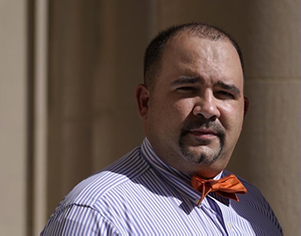
UMass Chan Medical School leaned into its commitment to partner with Native Americans by hosting an inaugural observation of Native American Heritage Month on Tuesday, Nov. 15, with a virtual presentation by David Shane Lowry, PhD, an anthropologist and citizen of the Lumbee Tribe of North Carolina.
“I’m very proud that our community has come together to create together with the indigenous peoples,” said Chancellor Michael F. Collins, after reading the land acknowledgement created with oversight from the Nipmuc community.
Dr. Lowry presented, “Evolving from Hippocratic Oath to Indigenous Oath: Your Responsibilities to American Indian/Native American Peoples in Medical Education.” Lowry commended the Medical School for its land acknowledgement but cautioned listeners that native peoples are generally nonexistent or underrepresented in institutions that acknowledge them.
Lowry addressed the struggle of many native students trying to live in a colonial educational infrastructure. For Lowry, this soul-searching work came from conversations with members of his tribe about why native people should pursue medicine. Some of those motivations included hearing testimonies from members of the Lumbee tribe who were used in eugenics experiments sanctioned by prominent universities in North Carolina.
Carrying these stories of erasure and his love for anthropology, Lowry followed career paths that allowed him to teach the nuances of race, politics and economics for students as they pursued careers in medicine.
Lowry gave examples of how society has normalized the erasure of native peoples by mocking them as part of social pastimes like sports. He said these practices give room for distrust between native peoples and the medical community who have been equal and active participants in these practices.
COVID- 19 exacerbated this sense of erasure when native people were left out of the conversation even when statistics showed that they were the most susceptible to contract and die from the virus. Navajo Nation was not given masks or other supplies, but they did receive body bags, he said.
“And the message from the Navajo Nation was that they were being prepared to die and not to live,” Lowry said. “So, the question becomes, why are American Indians and Native Americans missing from medical data?”
Lowry sited three factors: law, media and pedagogy in which natives have been denied their personhood and viewed as lacking complexities from the founding of the country and today. He noted that there are several spaces of inadequacies within the tenants of the Hippocratic Oath.
“One space of inadequacy is that American medicine individualizes the physician. Within the white coat, everything is tied to the clinic, to the clinician–patient relationship. There really is no sense of community within medicine across the board,” he said.
Lowry said the national medical school accreditation board, the Liaison Committee on Medical Education, should create policies that demand the presence of native faculty and students. Institutions need to ensure those students are successful, he said, suggesting that consultants within the indigenous community could be hired to support them.
Lowry encouraged UMass Chan to directly name native people in its diversity statements and policies and concluded his talk by reading a statement he wrote for the school to use as it moves forward. It reads:
“You are responsible for equipping your students for the inevitability that they will go somewhere else to train and or practice. If their life and medicine is disconnected from relationships with American Indian Native American peoples in the U.S. it is, by definition, a violation of human rights. If you are preparing them so that they are not in relationships with American Indian Native American peoples, you are creating a medical brain trust, which through standardized exams and clinical training and professional relationships is taught to disappear, erase and remain noncommitted to indigenous ways of being, you are preparing the student to stay shrouded in the white coat and in a non-discussion of the history of violence that underpins all of medical education. You must move past the Hippocratic Oath and to the utilization of medicine to restore, heal and live justly. First, ‘doing no harm’ is impossible without first peoples in positions of medical authority.”
Related UMass Chan news story:
Discussion of land acknowledgment is step toward more diverse, inclusive institution